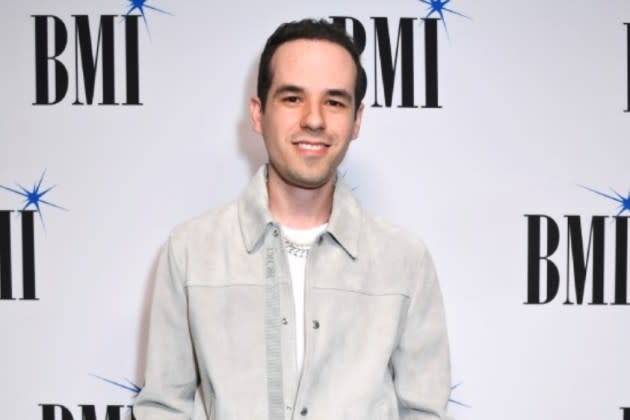Grammy-Nominated Songwriter Edgar Barrera on Representing Latin Music at 2024 Show: ‘I Already Feel Like a Winner’

Edgar Barrera is a Grammys rarity: The Mexican-American, Texas-born producer and songwriter is the only (and first) Latin act up for songwriter of the year at the 2024 awards. Less happily, he is also the only Latin act to appear in a Grammy category that isn’t Latin music-specific.
Be that as it may, those feats speak to his towering achievements: He has become the go-to songwriter for top-charting acts looking to expand their musical range (he’s responsible for pairing Bad Bunny with the Tejano band Grupo Frontera) and shares songwriting credits with Madonna, Ariana Grande, Maluma, Karol G, Shakira and Peso Pluma, among numerous others.
More from Variety
Here, Barrera shares the philosophy behind his songwriting style and reflects on his blockbuster year.
A common thread in the songs you’ve worked on features artists testing sounds that they aren’t known for. What is that like?
I have a lot of fun taking an artist out of their comfort zone. It makes my job interesting. [“De Vuelta Pa’ La Vuelta”] with Marc Anthony is a salsa record and it wouldn’t have worked as anything else, but Daddy Yankee fit right in as a feature. There’s also Shakira’s song with Fuerza Regida, and Manuel Turizo with Marshmello — I worked on something like 70 songs that got released this year and they are all different styles. That speaks to how massive Latin music has become.
And yet, you’re the only representative in the major categories…
It sounds cliché, but I already feel like a winner for that reason. It means a lot to be nominated in this category — one, because the Academy recognizes that this all starts with the songwriting, and on top of that, I’m nominated for Spanish-language songs.
For the song “Mi Ex Tenía Razon,” did Karol G come to you with the idea of a Selena-style melody?
Yes! Karol came to me with that request since she is a huge Selena fan. I started researching to try and figure out what synths to use, what drum sets and what keys were used for the [Selena] songs. It was fun for me because it became a puzzle — we wrote the lyrics and then produced it.
Karol previously told Variety she felt anxious about trying música Mexicana for fear of it coming across as inauthentic.
I get that. There were moments where Latin music was leaning urban, and although I’m not Puerto Rican, I gave it my best shot but there’s nothing like working with someone who gets it. Every time I’m working with Shakira, we’re listening to music and I’m playing her stuff I’m working on — music she’s probably not used to hearing. That practice has proven itself to be fruitful more than once. Like with Carin León and Maluma’s “Según Quién” — that started because Maluma expressed his desire to work with a Mexican artist, and I was already working with Carin. It’s a process of trial and error. What we’re doing is experimental.
Did you build “un x100to” knowing Bad Bunny wanted to jump on a cumbia song?
No, because I had written that song with another writer called Rios about a year and a half ago — but that version had the wrong arrangement. We had pitched it to different artists, and nobody wanted to cut the song.
I was kind of venting to Grupo Frontera about how no one wanted the song. Out of curiosity, they asked to hear it but I didn’t want to play the demo; instead, I played it on guitar and sang. That led to us recording the song and Payo (Frontera’s singer) had the idea to get Bunny. I was like, “That would be like trying to throw rocks at the moon — not going to happen, bro.” Two weeks later, I went to the BMI Awards and I met MAG — Bunny’s producer. I sent him “un x100to” and the day after, he called to tell me Bunny wanted in.
Speaking of Frontera, they recently signed with Noah Assad’s management firm but are also signed to your BorderKid imprint – how has your professional relationship evolved?
They’re here with me right now, actually — we’ve been working on a new record. The bond we have is crucial to our professional relationship. With my career as a songwriter, knowing the artist personally is what helps produce good songs. And with Frontera, we speak the same jargon which is something that I was looking for because I’ve worked with artists from all over the world and had to kind of learn the jargon from Colombia, from Puerto Rico for reggaeton music. But with Frontera, it feels like we all grew up together and ultimately, I just want them to enjoy their success.
We’ve partnered with Raymond Acosta (Karol G’s manager), who will take over the management because that is something I don’t know how to handle. The energy and the vibes between both parties have been amazing.
What has caught your ear in terms of sound these days? Does anything specific stand out?
With música Mexicana, a lot of the lyrics and the melodies are very traditional sounding but the production delves house music or dembow. The music is evolving in really unpredictable ways. [Frontera and I] have spent a lot of time trying to look for a different sound – switching an instrument out or testing different rhythms. Payo has been shooting past the moon with his collaboration requests (laughs) There are going to be a lot of fun surprises next year, for sure.
Best of Variety
Sign up for Variety’s Newsletter. For the latest news, follow us on Facebook, Twitter, and Instagram.
Solve the daily Crossword

